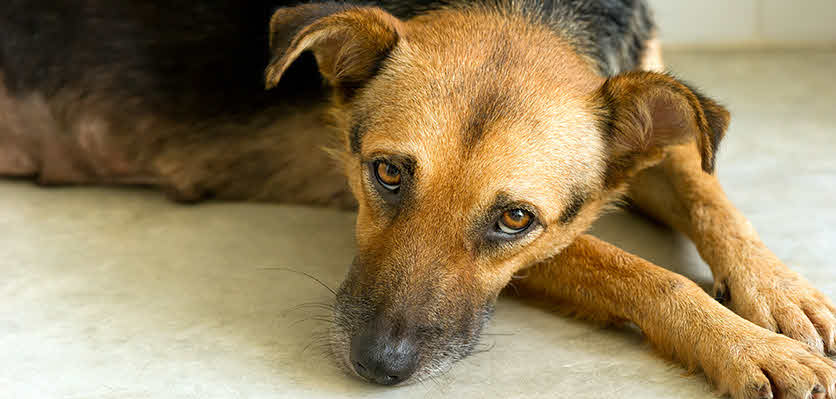
With the advancements in quality pet care and medical treatment, our pets are living longer resulting in a higher occurrence of age-related conditions. Dog dementia, clinically known as canine cognitive dysfunction, is a common issue in senior dogs where their behaviour becomes altered as a result of changes within the brain.
Often, the signs of dementia can be misinterpreted as simply ‘senior moments’ and part of the ageing process. Similar to Alzheimer's in humans, the condition cannot be cured but in recognising and understanding these behaviours, the condition can be managed to ensure your dog gets the best quality of life in their senior years.
Symptoms of canine dementia
Disorientation: This can include getting lost in the home or other familiar places, forgetting walking routines, aimless wandering or pacing, not recognising familiar people, reduced response to name or vocal commands, staring off at nothing, forgetting their food bowl location, or getting lost in corners or behind doors.
Reduced or abnormal activity: While decreased activity can point to other age-related conditions, altered behaviour such as reduced responses to environmental stimulus as well as reduced levels of play can raise concern. Alternatively, an increase in abnormal behaviour may occur such as restlessness, repetitive behaviour such as pacing or licking, and being unable to settle.
Inappropriate toileting: After ruling out any potential medical issues, a previously house-trained pet soiling in the house can indicate forgetfulness around where to toilet or when to signal their need to go.
Vocalisation: A start or increase in unprompted whining, barking, or howling often indicates anxiety or disorientation felt as a result of these cognitive changes, especially if this behaviour occurs at night.
Altered sociability: Changes in a dog’s social interaction levels or personality can be a big red flag, such as being less interested in seeking out attention, being irritable and even aggressive when approached, or becoming anxious or fearful when separated from their owner.
Changes in sleeping patterns: Dogs may vocalise, pace, or be unable to settle at night, with their sleep cycle becoming irregular or even reversed where they sleep during the day and stay awake at night.
How to manage canine dementia
- Speak to your veterinarian about the specific diets, supplements, and medications on the market that are designed to support brain function and address the symptoms of the condition.
- Execute a predictable and consistent daily routine to help orientate your pet.
- If changes need to be made to your schedule or your house layout, try to introduce them as gradually as possible to avoid confusion.
- Increase toileting opportunities to help avoid accidents. While it may be frustrating when these accidents do occur, remember that it is a symptom of their condition and scolding will leave them feeling frightened and confused.
- Physical exercise and environmental enrichment has been shown to reduce the risk of canine cognitive dysfunction as well as being beneficial for dogs living with the condition. Puzzle games and activities such as swimming or going out on short, familiar walking routes that fit with your pet’s level of fitness can help support their brain health.
Signs associated with canine cognitive dysfunction can also indicate other age-related medical issues such as arthritis, incontinence, or impaired hearing and vision. If you have noticed any of the aforementioned behaviours, consulting your veterinarian is the best way to get an understanding of age-related conditions and how to manage them to ensure your dog gets the very best out of their golden years.
